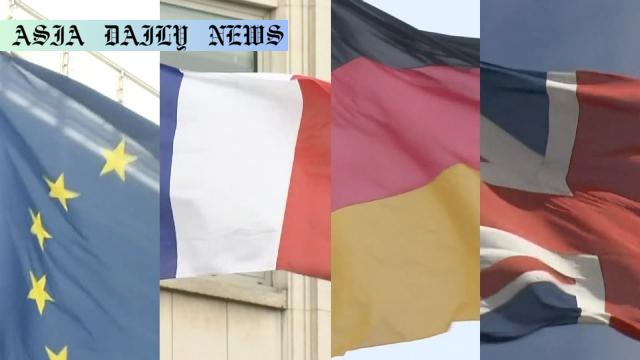Iranian nuclear talks. EU, France, Germany, and Britain aim to persuade Iran to return to negotiations on its nuclear program.

The Context of the Iranian Nuclear Program
In a significant move aimed at addressing escalating global concerns, the European Union, along with France, Germany, and Britain, will meet with Iran’s foreign minister in Geneva. This critical diplomatic engagement comes amid a gradual unraveling of discussions concerning Iran’s nuclear program. The talks, scheduled for Friday, can either shape the course of negotiations towards resolution or deepen existing conflicts. As sources reveal, EU foreign policy chief Kaja Kallas and the foreign ministers from these European nations will jointly engage with Iran’s representative, Abbas Araghchi.
Recent global developments have thrown Iran’s nuclear program into the spotlight once again. Concerns over Tehran’s reluctance to engage in recent negotiations have stirred anxiety among its European counterparts. Monday’s preliminary phone call led by the EU and all three nations emphasized their collective unease with Iran’s recent advancements in nuclear programs. While the European participants voiced their concerns, they firmly pushed for Iran to resume its long-abandoned commitments to dialogue.
The Goals and Challenges of Negotiations
The overriding goal of these renewed efforts remains clear: bring Iran back to the negotiating table. However, accomplishing this will not come without hurdles. Iran has, at times, demonstrated a mistrust of European intermediaries, citing historical grievances related to sanctions and breakdowns in previous agreements. Furthermore, the larger geopolitical dynamics of the Middle East continue to influence Tehran’s calculus.
The European Union recognizes the difficulty of navigating these talks amidst mounting skepticism toward Iran’s intentions. Despite these significant challenges, Europe is steadfast in its objective to foster dialogue and prevent further destabilizing nuclear developments. The talks in Geneva represent a crucial opportunity to convey Europe’s unified position and to delineate clear expectations from Iran moving forward.
Understanding the Regional and Global Stakes
Iran’s nuclear program is not just a regional issue; its implications reverberate across the globe. An unchecked nuclear program poses risks to nonproliferation regimes and exacerbates tensions in an already volatile region. For Europe, the stakes are especially high. The Middle East is a critical trade and energy conduit for European countries, and the escalation of nuclear activities poses significant risks to economic stability in the region.
Beyond the immediate concerns of escalation, there’s also the broader issue of regional influence. A nuclear-armed Iran could lead to a domino effect of instability, compelling neighboring countries to pursue similar capabilities. This prospect would not only threaten European allies in the region but also undermine global attempts to establish a meaningful nonproliferation order. For this reason, the upcoming Geneva talks have garnered significant international attention.
Potential Outcomes of the Geneva Talks
The Geneva summit holds the promise of fostering renewed dialogue and potentially building a framework for sustained negotiations. However, the success of these discussions largely hinges on Iran’s willingness to engage constructively. While the European delegation is bringing a unified message, it must also remain sensitive to Iran’s concerns to ensure productive engagement.
One potential outcome is the agreement on preliminary steps, such as transparency around Iran’s nuclear activities or allowing restricted inspections by international regulators. Such confidence-building measures could pave the way for broader agreements down the line. However, failure to reach an understanding could further isolate Iran diplomatically, making future discussions even more challenging.
The Role of the Broader International Community
While this particular meeting is focused on Europe and Iran, the involvement of other global powers—such as the United States, Russia, and China—cannot be ignored. These countries have historically played a significant role in shaping policy outcomes on the Iranian nuclear program. However, given the current tensions among global stakeholders on various fronts, Europe may see this as an opportunity to consolidate leadership in advancing mediation efforts.
The absence of the United States in these talks also reflects a shift in dynamics, particularly as these nations look to assert their independent foreign policies. Nonetheless, any long-term solution to the Iranian issue will require broader international support.
The Path Forward
The Geneva discussions represent a crucial juncture in addressing one of the most pressing global security issues of our time. Whether this opportunity results in constructive progress or deepens existing divides will depend largely on the willingness of all sides to compromise and prioritize long-term stability over short-term gains. The stakes are high, and there is hope that diplomacy can prevail in the intricate dynamics of international relations.
Commentary
The Importance of Multilateral Efforts on Iran
The upcoming Geneva talks highlight a significant moment for multilateral diplomacy. As the EU and three key European nations gather to address concerns over Iran’s nuclear program, it underscores the importance of collective efforts in tackling complex international challenges. This initiative is not just about safeguarding nonproliferation but also about preserving regional and global stability. Such a unified front sends a powerful message to Iran and the international community about Europe’s commitment to diplomacy.
The Broader Implications of Iran’s Nuclear Program
The Iranian nuclear issue is a matter of immense global significance. It extends beyond regional dynamics and touches broader concerns about the efficacy of nonproliferation treaties and the risks posed to global peace. If left unchecked, the program has the potential to destabilize not just the Middle East but also the broader geopolitical order. A nuclear-armed Iran could prompt neighboring countries to follow suit, creating an arms race that would threaten the safety of millions.
Optimism Remains Despite Challenges
While there are considerable challenges ahead, there is reason to remain hopeful about these renewed talks. The mere act of convening demonstrates that diplomatic channels remain open. Dialogue, even in the face of profound mistrust and divergent interests, remains the best path forward in resolving such high-stakes issues. By coming together in Geneva, Europe and Iran have an opportunity to move past past grievances and set a course for lasting peace and cooperation.


